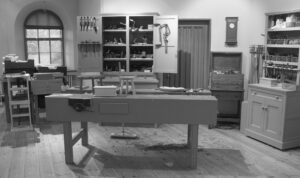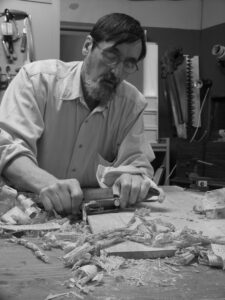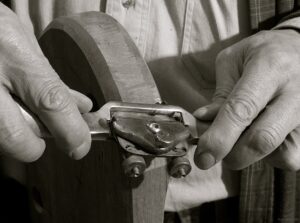My creative workspace – more thoughts
In a culture where most men now punch keyboards rather than swing an axe, write with a pen or dig a ditch, and where many men are dubbed big kids with Tonka trucks and owning hand tools they themselves call “new toys”, it’s sometimes hard to consider my work serious in crafting a living. This type of self deprecation, aside from demeaning, devalues craft as the art of work. Hand tool enthusiasts and those like myself who depend on hand tools to make a living are often slated as “not living in the real world.” I have lived with that for decades now, but because I believe in what I do and believe in vocational callings as the only way to attain true fulfilment at work, I continue to promote an ethos I see as true in worth and value. After close to five decades of working with my hands and earning a living that has supported my family throughout that time, I can say with honesty, I am fulfilled and if I died tomorrow I would not regret choosing my craft of working wood.
The occupations of carpentry, farming and gardening, woodcutting and such like, have become mere images of occupations past rather than life-supporting skills providing those essentials still critical to life today. Of course that’s no surprise as we no longer make, grow, bake or cook, preserve food, but buy all we use and mow lawned grass to throw it away. My point here is it saddens me to see any craft work dumbed down to mere hobbyist levels and amateurs who work proactively for the love of it considered less then professionals who in most cases find themselves losing their initial love for their craft to become workers only for money.
Skill and skilled work today is regarded highly but seldom seen. Fewer examples of skill can be seen in modern work, exhibitions at galleries and so. What was once common is no longer current but rare. The scarceness of skill is strangely increasing. The distance between two eras of high tech and low tech has never been wider than now, yet, stranger still is the fact that for a large percentage of western populations there is at least an acknowledgement that people would like to own skill and skilled work and that strange thing no longer spoken of, skilled workmanship. Skilled work once measured a prestige by those who owned it whether the craftsman or the patron.
Not many people, working people, can afford my work these days. It’s not that my work is expensive so much as life and work has become expectedly cheap. A chair mass-made in Romania in just under three minutes of human handling with no hand work as such sells for $75 or £75. My handmade rocker sells for $3,500 but takes me two weeks of 10-hour a day six-day weeks—7,200 minutes times $25 = $180,000. Of course, you say, that’s quite ridiculous. It depends on which side of the saw or plane you are on. It was my choice to become a life-style woodworker. I would never change this vocation I have invested my life in because it has been so worth it.
The UK, once known for it’s craftsmanship worldwide, undervalues good work and workmanship—it’s taken for granted and I think it’s been that way since the first world war, and it’s this that caused diminished levels of skill, craftsmen and women, jobs, new work and workshops and new designs exemplary of fine work. Here in North Wales workshop buildings stand empty and idle. Most towns on Anglesey and in the villages and towns of the whole of North Wales have workshops owned privately and by councils that have no tenants.
On other continents there is a currency of support I see that fuels interest and appreciation for skilled workmanship. This isn’t government-sponsored or educated into people, but inspired; breathed from one being to another, unbought, unfettered, living. It would be wrong to say it doesn’t exist in the UK too, just rarer, I think.
I like the idea, well, it’s not an idea, that we can inspire one another in skill. That seeing one man work, his works, his workshop, can infuse others. That an atmosphere carries a powerful enough charge to preserve and conserve a craft and a way of life like mine. People walk into my workshop, my creative workspace, smell wood, walk away, come back weeks later for a day, three days, a week and they become something they always wanted to be. They become woodworkers and nothing and no one can stop them—such is the power of vocation—ageism is overcome and so too youngism. It’s none age-related, none gender-specific. That vocare, that call into deeper things that gets you beyond money and fashion, peer pressure and consumerism, cheapness and unvaluedness.
I think that standards can be passed on as a foundation for others to then build on—non-negotiables if you will, where dead square means dead square and dovetails hand cut fit without gaps though cut by eye and hand. It’s not to do with compromise but honest work and uncompromised standards. My son finished a violin once, or was it a cello, and told me there was a mistake non one would ever know of or even see. It was a small mistake. I was sorry for the anguish it caused him at that moment, but the decision lay with him as to what he must do. As I said, I was sorry as only a father woodworker can be be. I encouraged him. It was late and we went to bed. In the morning the problem was resolved as he presented the instrument to me. Sleep escaped Joseph. He went to his workbench in the night and removed the front plate of the completed instrument, corrected the flawed work and replaced the plate (that’s the front belly of a bowed instrument). He kept the standard and couldn’t rest until he had all things reconciled. Such is the life of those who care.





